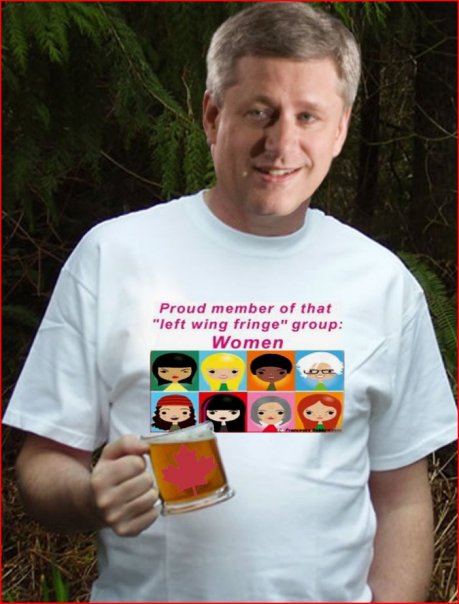Chip in to keep stories like these coming.
As a woman I’m grateful that there was finally an opportunity for the nation to hear about issues affecting Canadian women through a feminist lens. The Up for Debate interviews covered a wide range of topics, but today I’d like to focus on how the leaders addressed the issue of violence against women.
Who better to speak to the issue of violence against women than a woman? Especially a woman who has experience working at the House of Commons where women are the minority and there are no official rules of conduct governing members of Parliament.
Elizabeth May understands that violence against women stems from sexism, patriarchy, and a sense of entitlement that comes with being a privileged male. During her Up for Debate interview, May was in favour of creating a national action plan on violence against women; working with women’s organizations along with experts in the field of sociology; and she supported a national enquiry into our murdered and missing Indigenous women. Most importantly, May said very clearly that violence against women needs to be “named and shamed and out there and with zero tolerance for it.”
Thomas Mulcair declared himself a feminist during his Up for Debate interview. I was thankful for this because there are still people ignorant of the fact that feminists are simply women and men who believe equality for women is a basic human right. Mulcair also called for a national action plan on violence against women. In fact, NDP MP Niki Ashton’s motion, M-444, a National Action Plan to End Violence Against women was resoundingly rejected by the Harper government in May of this year. Mulcair would launch a national inquiry into the 1200 murdered and missing Indigenous women. He would increase funding to women’s shelters by $40 million.
Justin Trudeau wants to end the victim blaming that is prevalent in our society, and rightly so. He was clear that violence against women is not just a woman’s issue it’s everyone’s issue. He too declared himself a feminist. Trudeau said, “I don’t know where to point my finger. There’s probably an awful lot of factors that come together to shape societal behaviour.” Trudeau then went on to blame misogyny in certain types of music, the prevalence and availability of pornography, and communities in which fathers are less present than they have been leading to a deficiency of positive male role models.
Trudeau has since come under fire for his inadequate explanation of why violence against women exists in Canada. Desmond Cole criticized Trudeau’s response for being racist. While I don’t believe Trudeau intended his remarks to be racist, I do feel that his answer was woefully lacking in detail and substance. Trudeau mentioned presenting symptoms and supports rather than dealing with the root causes.
Gilles Duceppe believes in equality for Quebec women, but admitted that violence against women is “tough to explain.” Duceppe made reference to all religions not being very open to women. His response to the question of violence against women was worse than Trudeau’s.
Violence against women is not tough to explain when you understand that it’s the suppression of women by a patriarchal system kept in place by men who have a sense of entitlement. The poster boy for this old boys’ club is Stephen Harper.
The fact that Harper could not make time to address the issues that affect 54 per cent of all Canadians, their children, partners, families, and communities is nothing short of disgusting. Women make up 47 per cent of the Canadian workforce. Affordable, universal child care; affordable housing; pay equity; the environment; climate change; and violence against women are not only women’s issues they’re human rights issues and economic issues that financially impact individuals, families, communities, every level of government, as well as Canada’s gross domestic product.
I volunteer with many non-profit organizations that address the issues of poverty; hunger; housing; violence against women; and women’s issues. One of these organizations invited all female candidates running in Halton Region to speak with our members. The NDP, Liberals, and Conservatives had women registered as candidates. Not a single Conservative candidate responded to their invitations.
Janice Best (NDP), Pam Damoff (Liberal), Karina Gould (Liberal), and Che Marville (NDP) were knowledgeable, understanding, insightful, compassionate, and shared an air of co-operation. If only we could get all four of these fabulous voices to Parliament Hill then they would vastly improve the lives of Canadian women and in turn, Canadian families, the environment, and of course, the economy.
Harper don’t think that you’re off the hook by playing hooky from a national discussion about the human rights of Canadian women and girls. Mr. Harper, since you’re busy with your election campaign, and since Conservative candidates are unwilling to talk with Canadian women, I’d like to ask you one simple question — What’s your stance on women’s rights?
Chip in to keep stories like these coming.



